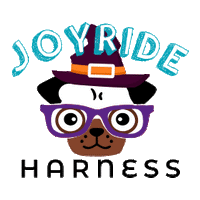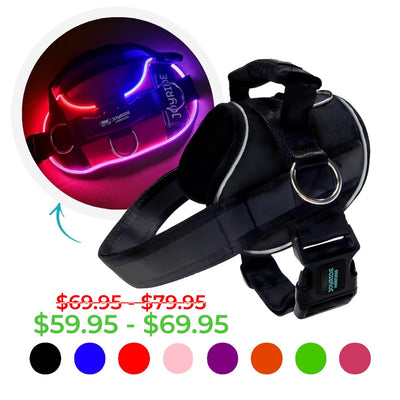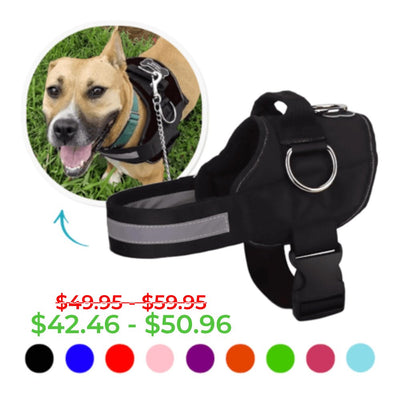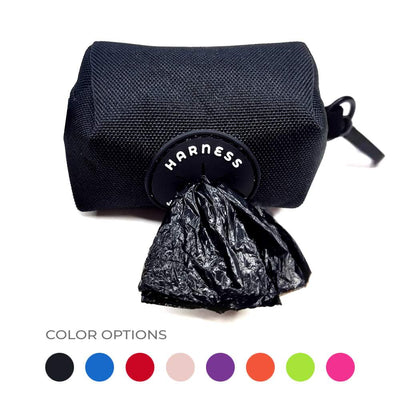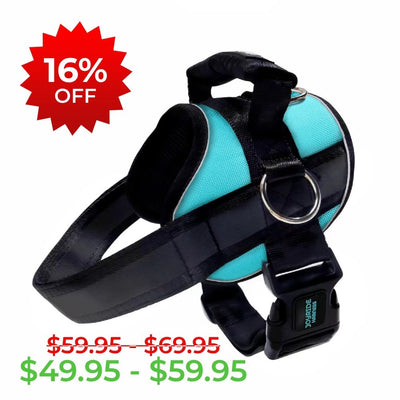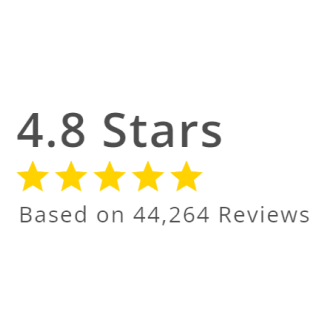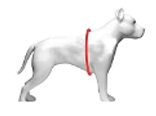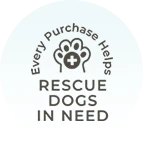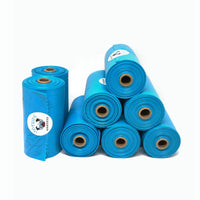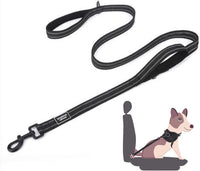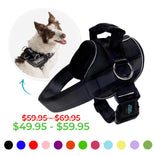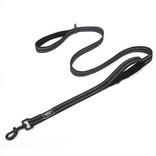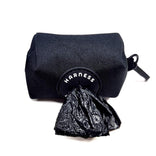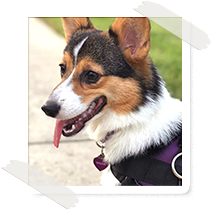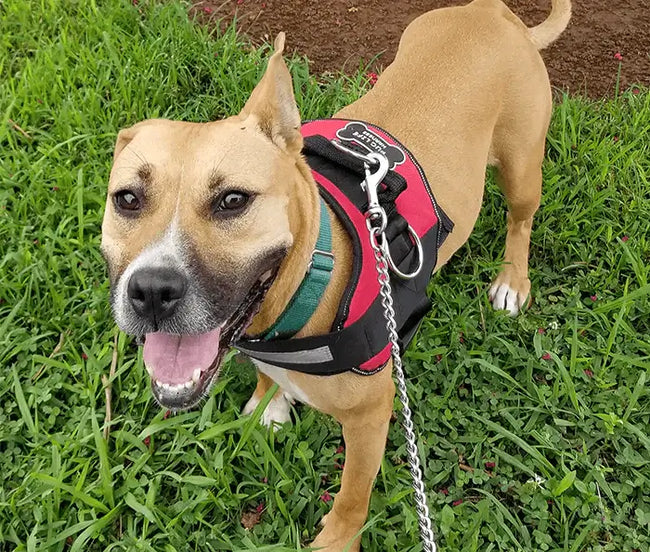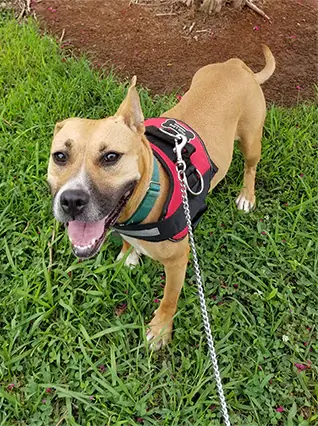Do Dogs Need Carbohydrates?

Disclaimer: Joyride Harness are not medical professionals. The information shared in this article is from our research. You should always consult your veterinarian.
Dry kibbles are an extremely common part of most dog diets today, but this is not the food their ancestors or even wild dogs eat.
You might remember our blog on breakfast for dogs where we shared that dogs get an energy boost from carbohydrates, but meat keeps dogs sustained throughout the day.
This begs the question: do dogs really need carbohydrates in their diet? Let’s find out!
What are Carbohydrates?
Carbohydrates (also called carbs) are a type of macronutrient found in certain foods and drinks. Sugars, starches, and fiber are carbohydrates.
- Sugars and starches: These are digestible carbs that give vitality to your precious pooch.
- Fiber: Fiber is crucial to keep your dog’s digestive system functioning as it should.
Other macronutrients include fat and protein. These macronutrients keep your dog healthy.
As long as your pup is fed a balanced diet (including proteins and fats), carbohydrates will do their job. Protein is essential as a muscle-building nutrient, fats support cell growth, and carbohydrates are the main source of energy.
There are some foods that are healthy and unhealthy for your dog.
Common Carbohydrates in Dog Food
Common carbohydrate sources used in canine diets include grains, fruits, vegetables, and a few other ingredients.
Carbohydrates you may see on the dog food label:
- Whole corn
- Millet
- Potatoes and sweet potatoes
- Brown rice
- Oats
- Barley
- Fruits
You can find carbohydrates in dry and wet dog food.
Whole Grains in Dog Food
“Whole” grains, which contain the entire grain kernel (the bran, germ, and endosperm), are good quality carb sources. They include whole wheat, bulgur, oatmeal, corn/cornmeal, brown rice, buckwheat, and others. When you find these ingredients in a kibble (or canned food), they will be cooked and therefore readily digestible. For home-prepared diets, it’s essential to cook these grains well, often soaking overnight, to increase digestibility.
Whole grains pack a powerful punch of dietary fiber, B vitamins, and important minerals such as iron, selenium, and magnesium.
Refined Grains in Dog Food
Dog “refined” grains have been milled, which removes dietary fiber, iron, and many B vitamins, so refined grains provide little nutrition but still contain the same number of calories. Refined grains are processed quickly, resulting in a more immediate impact on blood glucose levels.
These grains are less desirable.
Are Carbohydrates Good for My Dog?
Your dog’s nutrition is important.
Dogs typically have a high tolerance for carbohydrates and can obtain large percentages of their daily calories from carbohydrates (up to ~75% of calories), especially if medical conditions limit the amount of fat or protein that can be safely fed.
In fact, one of the most dramatic genetic differences between dogs and wolves is that dogs have many more copies of the gene that codes for amylase, the pancreatic enzyme used to digest starch, showing that they evolved from wolves to be more adept at processing carbohydrates.
Should I Feed My Dog Carbohydrates?
As discovered by the Nutritional Research Council (NRC), it has been proven that dogs do not require a high amount of carbohydrates, yet they allow 30-60% of pet and veterinary-approved foods to contain carbohydrates.
So what should you feed your dog? We have some recommendations.
What to Consider When It Comes to Carbohydrates for Dogs
You can approach your dog nutrition the way they would naturally eat, but today's domestic dogs have evolved from their carnivorous ancestors to become omnivores. As such, they can and should be fed with carbohydrates as well as proteins and fats.
We’ve outlined some of the good and bad carbohydrates for your dog so make sure to read the ingredients on every dog food bag. Also, be sure to consider:
- What age is your dog? Are they a puppy, adult, or senior dog?
- Does your dog have any medical conditions that may affect the type of food they require?
- What is the gender of your dog?
- Is your dog spayed or neutered?
- How active is your pooch? An athletic dog will need a different diet than one that doesn’t get much exercise.
What About a Grain-Free Diet for My Dog?
Grain-free diets have become more popular among dog owners. Some veterinarians have recommended these diets due to dogs showing sensitivity to gluten.
But is a grain-free diet better for dogs?
The FDA Investigated Grain-Free Dog Food
Well, in 2018, the FDA investigated potential links between canine heart disease and diet — specifically grain-free dog food diets. The foods of concern were those containing legumes such as peas or lentils, other legume seeds, or potatoes listed as primary ingredients.
They examined labels of dog food products reported in the cases to determine whether the foods were “grain-free” (no corn, soy, wheat, rice, barley, or other grains) and whether the foods had peas, lentils, chickpeas, beans, or potatoes (including sweet potatoes).
Their report states that more than 90% of foods reported in these cases were grain-free, 93% of reported foods contained peas and/or lentils, and 42% contained potatoes/sweet potatoes.
Boutique companies, foods with exotic ingredients, and grain-free diets could be linked because of the replacements used for grains, said Lisa M. Freeman, DVM, Ph.D., DACVN in the Dec. 1, 2019 version of the Journal of the American Veterinary Medical Association.
Freeman emphasizes that although there appears to be an association between canine heart disease and BEG diets, the relationship has not yet been proven but precaution is still encouraged.
Feed Your Dog A Complete and Balanced Diet
We all want to approach our dogs' nutrition the way they would naturally eat, but today's dogs have come a long way from their carnivorous ancestors.
Domestic dogs are omnivores and they can and should be fed proteins and fats as well as healthy carbohydrates.
We encourage you to speak to your veterinarian to weigh the pros and cons of certain diets or foods for your dog so they can be and stay happy and healthy.
For more doggie photos and pup-related fun, follow us on Instagram at @joyrideharness. And for a more detailed blog post about finding the best size dog harness for your pup, check out this blog post!
